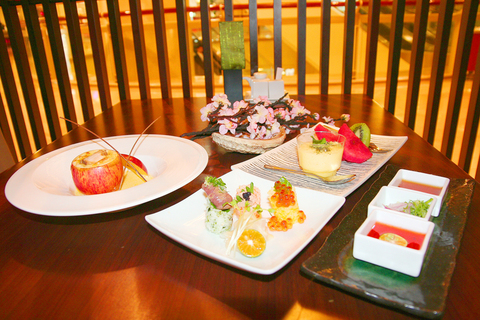Impeccably dressed in a formal suit and silk tie the manager of Wasabi, Ken Chen (陳偉德), placed a live abalone and tiger shrimp on a dish piled with steaming stones, then added sake. There was a whoosh and the air became scented with alcohol, herbs and seafood.
Other diners looked around, surprised by the sound or fragrance, and watched as Chen discreetly covered the plate with a lid that had a small hole in it, allowing a jet of steam to escape. We were told this was done so no-one had to witness the death throes of our tasty mollusk and crustacean.
It doesn't get much more natural or fresher when the catch-of-the-day is live abalone from waters near the South Pole.

PHOTO: JULES QUARTLY, TAIPEI TIMES
“Abalone is the king of seafood,” said the executive chef of Wasabi, Yankee Yang (楊正全). “These shellfish are from the least polluted seas in the world, off the Tasmanian coast by the South Pole. This live performance is a traditional and creative way of cooking. You really can taste the sea.”
The “Live Australian Abalone Set Menu” is a seven-course meal of fusion fare crafted by Yang, who learned the arts of preparing sashimi and sushi in Japan.
The meal began with abalone salad, which was served with green asparagus and bamboo shoots. The bream soup was artfully prepared as the fish was given a thin covering of flour before being steamed, so it retained its full flavor and moisture.
As may have been expected the quartet of sashimi slices — abalone, octopus, fish and shrimp — were excellent, partly because they came with wasabi made that day, grated from the root rather than recombined from powder. The sushi platter offered four taste explosions, notably the foie gras, which was outstanding.
The only dish your reviewer had reservations about was the grilled and buttered abalone in apple. The various fish elements were overpowered by a fruity, creamy, almost cheesy taste. Asian palates, we were told, are tickled by this combination but it left us unmoved.
Over 1 million Japanese visitors a year pour into Taiwan because it's relatively close, has the tallest building in the world and has many of the trappings of home: namely good shopping, hot springs and fresh fish prepared in a Japanese style.
Wasabi in the Taipei 101 Mall, therefore, is a popular destination for these tourists. So, unless you want to wait for a table and perhaps be disappointed, booking is advised.

April 14 to April 20 In March 1947, Sising Katadrepan urged the government to drop the “high mountain people” (高山族) designation for Indigenous Taiwanese and refer to them as “Taiwan people” (台灣族). He considered the term derogatory, arguing that it made them sound like animals. The Taiwan Provincial Government agreed to stop using the term, stating that Indigenous Taiwanese suffered all sorts of discrimination and oppression under the Japanese and were forced to live in the mountains as outsiders to society. Now, under the new regime, they would be seen as equals, thus they should be henceforth

Last week, the the National Immigration Agency (NIA) told the legislature that more than 10,000 naturalized Taiwanese citizens from the People’s Republic of China (PRC) risked having their citizenship revoked if they failed to provide proof that they had renounced their Chinese household registration within the next three months. Renunciation is required under the Act Governing Relations Between the People of the Taiwan Area and the Mainland Area (臺灣地區與大陸地區人民關係條例), as amended in 2004, though it was only a legal requirement after 2000. Prior to that, it had been only an administrative requirement since the Nationality Act (國籍法) was established in

Three big changes have transformed the landscape of Taiwan’s local patronage factions: Increasing Democratic Progressive Party (DPP) involvement, rising new factions and the Chinese Nationalist Party’s (KMT) significantly weakened control. GREEN FACTIONS It is said that “south of the Zhuoshui River (濁水溪), there is no blue-green divide,” meaning that from Yunlin County south there is no difference between KMT and DPP politicians. This is not always true, but there is more than a grain of truth to it. Traditionally, DPP factions are viewed as national entities, with their primary function to secure plum positions in the party and government. This is not unusual

US President Donald Trump’s bid to take back control of the Panama Canal has put his counterpart Jose Raul Mulino in a difficult position and revived fears in the Central American country that US military bases will return. After Trump vowed to reclaim the interoceanic waterway from Chinese influence, US Defense Secretary Pete Hegseth signed an agreement with the Mulino administration last week for the US to deploy troops in areas adjacent to the canal. For more than two decades, after handing over control of the strategically vital waterway to Panama in 1999 and dismantling the bases that protected it, Washington has